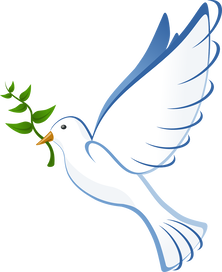 The miracle in John 5:1-9a is the second Jesus performed in his hometown. Jesus was attending a Jewish festival in Jerusalem and chose to visit this pool where so many who were crippled and disabled lay in wait beside the pool for the disturbance of the water in the expectation that it would heal them. Jesus hears of this man who has been languishing by the pool for 38 long years waiting for someone to just lift him and lead him to the pool. He walks up to him and asks him the most “ridiculous” question! “Do you want to be made well?” If I were a disciple, standing next to Jesus, I would have said “Come on Jesus, what kind of a question is that? Isn’t it a bit obvious that this person wants to be healed?” But we all know Jesus does not speak out of turn. There is a purpose behind his question. “Do you want to be healed?” We live in an Asian context where “fatalism” is almost a cultural trait. We have often heard people saying “Oh that is our fate” “You can’t question it. It was destined to be this way” – a sense of fatalism that has conditioned us to accept the bad things that happen to us. Jesus’ words shake this man out of this sense of lethargy and fatalism. There is no direct response from the man to Jesus’ question. He merely begins to complain. “There is nobody to lead me to the pool.” He does not expect or envision divine healing. He is only dependent upon the worldly form of healing. How like us who are always focused on our own way of thinking, materialistic and worldly. We have often heard of faith bringing about healing – the healing of Jairus’ daughter, the woman in the crowd who touched Jesus’ robe for healing - all these people demonstrated implicit faith and obtained healing through faith – but here, we find a story which does not talk about faith. This man did not know Jesus, he didn’t ask to be healed and did not demonstrate faith but he received God’s grace freely without any conditions. This episode shows us a different aspect of our God – God who sees our needs, who is filled with compassion and grants us unconditional healing. Jesus says “Rise! Take your mat and walk!” Three strong, clear commands. The Greek word for stand up or “rise” is egeiro, which also means “awaken”. Jesus urges the man to awaken into a new beginning, to awaken from his sense of victimhood, shed his disgruntled disposition and rise. That was his first step. But to just rise is not enough! “Take your mat…” The man was asked to roll up his mat. To us, the logical course of action would be to leave the mat behind! We would have said to him “Leave your mat, it tells your sordid stories” - but that is not what Jesus says. Why? The mat has been taken as a symbol in our service today. As such let us dwell on the significance of the mat in Jesus’ miracle. The man’s whole life and his sad story were woven around the mat. When Jesus urges him to take the “mat”, Jesus was reminding him that he had to be mindful of the way he had come. This is where the mat becomes symbolic – reminding us that the past that we have come through - although painful and full of strife – becomes a tool that transforms and strengthens us in our onward journey. Secondly, looking back at the way we came, assures us of God’s eternal grace, grace which is freely given. Looking back at our past reminds us to be always sensitive to the needs of others and helps us clothe ourselves in humility. After this man’s encounter with Jesus – the mat takes on new meaning and becomes a symbol that reminds him of Jesus’ healing. He is required to take up his mat - not a new mat - but the same mat woven with the sad stories of his past which has now become the mat of redemption, responsibility, the mat of remembrance of the loneliness that he had faced, which in turn makes him sensitive to the pain and suffering of others. What is Jesus’ third command? “Walk”. This is the healing in this story – Jesus restored the man into wholeness, Jesus empowers him to claim personal agency. He has gained his independence, regained assurance and now he has to ACT! “Walk”. Reading the letter of the Zimbabwean women and men in the worship service, we are brought close to them through their challenges, struggles and suffering because of poverty, separation, drug abuse, violence of all kinds. Mothers, wives and sisters await news of their family members who have been made to disappear; deaths due to HIV and Aids and domestic violence - situations similar to ours. We are all yearning for peace and a peaceful existence and striving for peace and reconciliation. Just as Jesus picked out this man in the multitude of crippled and sick people, he has seen and heard our cries and commanded us to arise, take our mats and walk. Let’s walk into the future with the faith and confidence that Jesus gives us out of the bounty of his grace. Jesus has seen our needs, healed us and summons us to walk on. By Shiranee Mills, an activist who worked hard in the North during the ethnic conflict in Sri Lanka. She served as Principal at a Christian girls school, and is currently retired living in Colombo. This reflection was part of the World Day of Prayer celebration on March 6th, in Sri Lanka.
2 Comments
Today we celebrate the World Day of Prayer service bringing to mind the struggles of women across the world, especially our sisters in Zimbabwe. I want us to reflect today on ‘the Gospel according to the Mat’ (John 5:2-9a). So, welcome to the gospel according to the perspective of the mat! I am the mat… like the symbol received as you entered the chapel. I am the mat, on which the hero of our story lays for 38 years, waiting to be healed. I was with him waiting all along. I waited long enough to realize that I was not the magic carpet of Aladdin. Even after 38 years, I could not transport him to the magical pool when the water was disturbed by the mythical angel. I was not the only mat around. There were many of us holding those that the system had named as the ‘invalids’. In fact, literally speaking, we held the system in place. The system, which had successfully, made the people believe that there was only one solution to their problems. The system, which had made the suffering people competitors to one another in a context where compassion was needed instead. The system, where the blame for not being healed was placed on the sick people themselves. The Greek word for paralytic literally means ‘dried out’. This system had literally dried out both the body and spirit of my owner. Then, one day, something special happened. A young man appeared on the scene. He came to my owner and asked him to do something different. He did not ask him to compete against the others, or get down to the pool first, but instead asked him to rise, take up his mat and walk. By asking my owner to take up the mat – this young man, whose name was Jesus, was asking my owner to give up the very system he had believed in and relied on for the past 38 years. He was asking him to courageously embrace a new way of living - a way that was not dependent on the system or its brokers. Once my owner acted upon his words, I ceased to be a symbol of the system that kept him dependent and enslaved. I became a symbol of transformation. It was time for me to be folded up and carried away. Folding me up and tucking me under his shoulders was like bidding goodbye to the system. It was interesting that the man, who healed my owner, did not ask my owner to abandon me by the poolside. Instead he was to carry me around – as a sign of transformation. I was no longer the sign of bondage; I was a living sign of liberation and freedom. That is the point I want to make today – many of us who are often thought to be part of the system can also become the signs of its transformation. Let me explain more. When people saw me folded up in the man’s hand – they saw it as a sign that the structure had been changed. So, they started questioning - who is responsible for this? How could this change happen now? I realized that I had become almost a teaching tool. This was the way that Jesus, the man who healed my owner, brought about transformation. He often did things which provoked people to examine their own beliefs and way of life. His acts of healing became a moment of teaching – a moment of questioning the system through the eyes and ears of those who were most oppressed by it. I know you are not here today to hear a silly mat speak to you. Today I want to draw your attention to many other living mat in our world, who from being symbols of an enslaving system have been transformed into signs of transformation. Whose lives have become teaching tools like the folded mat? One story I want to share is that of the Women of Zimbabwe Arise, or WOZA campaign. The WOZA campaign is a civic movement which emerged to provide women with a voice and visibility to foster change in Zimbabwe. This movement uses a campaign of “tough love,” using the traditional role and moral authority of a mother, calling for a new kind of society where equality and social justice prevail. What is interesting about the campaign is how the women transformed their time under arrest, as a chance to educate others about human rights and correct those in positions of power who are harassing the people. With demonstrations of love— WOZA women provide the nation with a new way to hold policymakers accountable. Today, we remember all such living mats that standout as symbols of transformation. We need to ask ourselves about how often have we become a part of enslaving structures. We need to remind ourselves of the urgency in becoming signs of transformation. Today the words of Jesus Christ, to the crippled man come to us afresh -- Arise, take up your mat and walk. The time to act is now. Let us rise in faith, lift up our mat in hope and walk in love. Amen. Written by Rebecca Sangeetha, a theologian and a New Testament scholar. She loves to do contextual interpretations of the Biblical stories through the eyes of a woman, especially Dalit women, marginalised communities of women, men and children. A graduate of the United Theological College, Bangalore, and the King’s College London (M.Phil.), she currently works at the Lutheran World Federation, Geneva, Switzerland, and belongs to the Tamil Evangelical Lutheran Church, India. This reflection was delivered on the World Day of Prayer celebration, March 6th, at the Ecumenical Centre chapel in Geneva.
This poem is dedicated to all the women in the world who reflect their faith in action and promote the movement of ‘informed prayer’ and ‘prayerful action’.  The Flame Lily is the National Flower of Zimbabwe The Flame Lily is the National Flower of Zimbabwe Blossom Sisters! Blossom! Blossom like the Red Flame Lily of Zimbabwe. Growing from the womb of mother Earth, In midst of pebbles and thorns of life, Blossom to celebrate life and strive for ‘life in its fullness’. For Christ has given us the power, To rise up, pick up our mat and walk. Blossom Sisters! Blossom! Blossom like the Red Flame Lily of Zimbabwe. As our sisters of WDP Zimbabwe invite us to hear their voices, stories and pray with them, Blossom to spread your scarlet petals and flower pregnant with ripe pollens of love, Spread the fragrance of ‘informed prayer’ and ‘prayerful action’. Prayer that transforms lives and heals. For Christ has blessed us with the power, To rise up, pick up our mat and walk. Blossom Sisters! Blossom! Blossom like the Red Flame Lily of Zimbabwe. Strengthen one another to weave the web of love. Like the song of buzzing bees sucking nectar from the lilies, Sing together songs of justice and peace sparking hope. As the red lily dances, kissed by the wind under the copper sun, With the rhythms of your body, dance to the tunes of songs of freedom, Dance to break status quo, the culture of violence and bondage. For Christ has blessed us with the power, To rise up, pick up our mat and walk. Blossom Sisters! Blossom! Blossom like the Red Flame Lily of Zimbabwe. With heart filled with red passion, empathy and love, Engaging in praxis-oriented prayer, wiping away tears, Of grandmothers struggling to give life to disabled abandoned grandchildren, Women walking miles with bruised feet in search of safe drinking water, Mothers toiling hard in poverty to feed hungry children, Weep with tears of empathy for trafficked daughters living with HIV/AIDS. For our tears are not tears of weakness but resilience and strength. For Christ has blessed us with the power, To rise up, pick up our mat and walk. Written by Rev. Moumita Biswas, WDPIC Regional Representative of Asia
Artwork by Mehuli Rusha Biswas 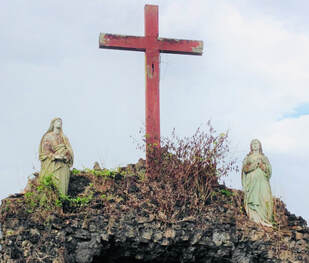 This Easter Sunday will never be forgotten. Many of us won’t be able to gather for worship in our churches and greet each other with “Hallelujah, Christ is Risen! Yes, indeed Christ is Risen!” Instead, we will be home, either alone or with our close family connected online with our worldwide sisters and brothers declaring Christ’s victory over death. In this time of the Coronavirus disease (COVID-19) pandemic, we stay home to save lives. We pray from our own sanctuaries and lift up to God all who feel like they are in the darkness of the tomb. We trust there is light after darkness. Mary Magdalene and the other Mary remind us of World Day of Prayer women preparing the worship service for the First Friday of March. The WDP women give their time to prepare the rituals of encounter and prayer that nurture fellowship and hope in the community. For the two Marys though, that first day after the Sabbath started early. They went to prepare the rituals of burying a loved one – Jesus Their arrival to the tomb was preceded by the dramatic appearance of an angel of the Lord. The angel understood well the reason for their visit and their feelings. “Do not be afraid. He is not here,” said the angel of the Lord. After the encounter, filled now with fear and great joy, the two Marys ran to share the good news with the disciples (Matthew 28:1-9). This Easter, we may have these mixed feelings of fear and joy. How can we let the news given by the angel nurture ourselves? Perhaps by letting go of our fear, caring for each other, and creating space for the great joy of being united in the same prayer -- Hallelujah, Christ is Risen! The word of the Risen One remains a promise of life for all of us. Jesus has gone before us, leading us from death to life. Through our most dire situations, let us dare to live with great joy and hope. Then, like the disciples, we will take hold of Jesus’ feet and feel encouraged to see the signs of resurrection around us. Truly, Christ is Risen! Amen! #WDPUnitedInPrayer - Laurence Gangloff, WDPIC Chairperson and Rosangela Oliveira, WDPIC Executive Director
 I had planned to celebrate the World Day of Prayer again with my colleagues at work on March 18th. But the French government’s measures to protect the population from the Coronavirus disease (COVID-19) transmission decided otherwise. So, this morning I put away everything I had prepared except for three candles marked "Love-Peace-Reconciliation", as suggested by our Zimbabwean sisters. I decided to light them in my home, as an act of hope. Though confined for a week in my beautiful house with my family in good health, I do thank God. I thank God for all that is beautiful and good. Watching the movement of the flames of these candles, I pray for those who are fighting the COVID-19 in hospitals - the sick and the healthcare workers. I pray for those who are facing their illness at home and feeling more confined than ever. I pray for all those who create gestures of solidarity. I pray for all of us:
Love and blessings to all of you!
- Laurence Gangloff, WDPIC Chairperson  We are on the Fourth Week of Lent, and John 9 is one of the readings of the Lectionary for the week. This healing story is similar to the one in John 5:1-9a, which is the basis for the worship service written by WDP Zimbabwe for our common day of prayer in 2020. Our Zimbabwe sisters inspired us to think of healing as transformation. “Jesus empowers us to be made well by doing something for the transformation that God is offering – to rise and take up our mat, whatever that may be for us, and walk.” Healing is at the center of people’s minds and actions to stop the transmission of the coronavirus disease (COVID19). What are some of the things we can do?
Share with us your prayers, poems, songs with words of hope, love, healing and care. When washing your hands, offer a prayer. The prayer that Jesus taught us can be done in 20 seconds. For more information, visit the WHO website. Good day, my dears! Thanks God for being faithful! For many years we have made plans to overcome the situations or troubles we face in Zimbabwe, but we are fast realising that there are no more plans to make. We are weary of the situations we are facing, we have nowhere to go but to God and to humble ourselves before God in prayer. Rain has been dolefully inadequate but paradoxically some areas have been flooded out. When engulfed by troubles, we need to remember to rely on our faith in God. When we look at the situations around us, we see why we cannot sort ourselves out, or why we can no longer "make a plan." And we may ask ourselves, what do we want from Jesus? Do we want to be healed? Do we want to accept what Jesus is offering? Pray that we may be obedient to Rise, Take Up Our Mats and Walk. The month of March is here! We are so excited and expectant to receive the breakthrough that will change the situations of Zimbabwe. Zimbabwe will never be the same. We all Rise, Take Up Our Mats and Walk towards the blessings Jesus has for us, blessings of LOVE, PEACE and RECONCILIATION in our homes, communities, countries and the world. In preparations for the WDP program, we are expanding our ecumenical relationship, serving our communities in need, and organizing the celebrations. We were busy collecting things to donate to the victims of cyclone Idai, we held training sessions on making reusable sanitary pads and bead work with care givers and children with disabilities, and now we are inviting everyone around Zimbabwe and outside of Zimbabwe to come and celebrate with us. The steering committee meets frequently to pray and plan an intense program for March. There will be WDP worship services in several churches on March 6. Then we are inviting all to come to the World Day of Prayer Zimbabwe Celebration Day on March 26. It will be held at City Sports Center, Harare, from 09h00 to 14h00. The Celebration Day will have the participation of many organizations such as the Girls Guides, Scripture Union, and the Salvation Army women’s band. Women’s choirs from several churches will form together one huge choir to sing the worship service songs. A Market Fair will showcase the best of Zimbabwean women entrepreneurs’ products in fashion, jewelry, household items, pottery, basketry, crotchet products, wood carvings, and much more. God has shown us favor to have the whole world praying with us. Everyone is so joyful. We thank you for joining us from wherever you are. We feel the blessing coming towards us. Together we will sing: Rise! Take your mat and walk Walk away from sin Walk away from injustice Walk away from violence Walk away from hatred Rise with your heart full of love Let us take our mat for peace Among ourselves in Christ We are reconciled By the WDP Zimbabwe Committee *Words and music by Sylvia Marowa, WDP Zimbabwe. ©WDPIC.
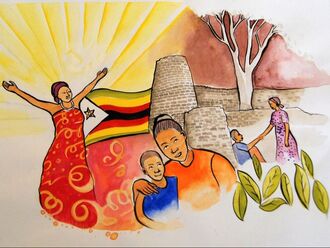 As we get closer to what we have been preparing with enthusiasm and creativity, the voices of the women from Zimbabwe, intertwined with our own, bring alive a message of love, peace and reconciliation. The WDP women of Zimbabwe invited us to pray with them. Many communities gathered together to deepen their reflection on the theme based on the story of John 5, 1-9a. The three verbs - “Rise, Take and Walk” – indicate action. Jesus used those verbs on two occasions: to a sick man (John 5) and to the paralyzed one carried by four other men (Mark 2). The verbs indicate the change for those in the stories. These verbs are still powerful for us, today! Our Zimbabwean sisters showed us the way. “Jesus empowers us to be made well by doing something for the transformation that God is offering—to rise and take up our mat, whatever that may be for us, and walk. Jesus empowers us to choose to be healed, to be made whole, perhaps physically, mentally, spiritually, and socially. When we are made whole, we are reconciled to God, to ourselves, and to our community. When we are reconciled, we can truly love, and when we truly love, we are able to walk toward peace. So, “Rise! Take your mat and walk.” (Extracted from the Worship Service 2020) “WDP encourages responsible action that grows out of the worship service” (WDP Guiding Principles, 9, b). What are the actions that the worship service will inspire you to take? In that way, WDP will fulfill its motto “Informed Prayer. Prayerful Action.” We join you, and especially the people of Zimbabwe, in prayers for the Holy Spirit to be at work in our hearts, so we can feel the push that makes us Rise, Take and Walk! We wish you a blessed and happy feast! Laurence Gangloff, WDPIC Chairperson & Rosângela Oliveira, WDPIC Executive Director
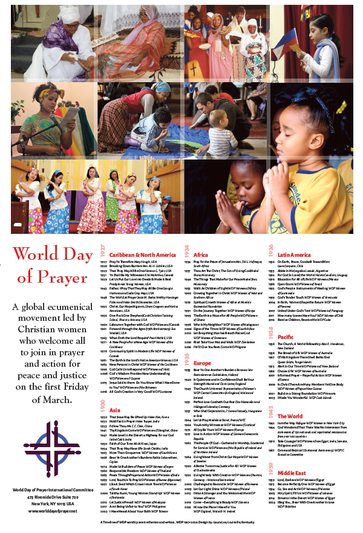 How does World Day of Prayer tell the story of united prayers led by women around the world? For almost 100 years, women have been inviting the communities to listen to each other and to create common responses to help the ones in need. The themes that motivate the prayers since 1927 up to 2026 are a testimony of how women commit to putting their hope into action. From the 1927 service entitled “Pray Ye Therefore”, written by Mary Hough, USA, to the 2020 service written by women in Zimbabwe under “Rise! Take your Mat and Walk”, we underscore our way of being active listeners to foster ecumenical solidarity. The faces of the communities in prayer around the world are displayed on the WDP Timeline poster, released in 2018. They represent the prayers that come from Samoa, Zimbabwe, Lebanon, Uruguay, Hungary, Taiwan and Bahamas (from top left to bottom right). Let’s learn the stories behind the faces!
Amazing how the year is almost over! Here we are in the Advent, Christmas and Epiphany season! I am back to reading the nativity stories, and I especially appreciate the angel’s message to Joseph in the Gospel of Matthew. “Do not be afraid” (1,20). “Get up, take… and flee” (2,13). It is impossible for me not to see a parallel with the theme for 2020 World Day of Prayer prepared by the women of Zimbabwe. The main Bible text for the 2020 program is taken from John 5. Jesus said to the man who had been sick for 38 years: “Rise, take your mat and walk”. This man had no hope. He was lying down next to the pool, knowing he had no chance to be healed by its water. Then Jesus asked him “Do you want to be made well?” He couldn’t answer with a logical “Yes, of course!” Instead, he first explained all the problems he was facing to reach the water. To the Samaritan woman, Jesus would have given the living water (John 4, 10) but to this man, he said “Stand, take… and walk” (John 5,8). It is impossible for me not to see a parallel with the daily news. From Beirut to Hong Kong, from Paris to Bethlehem, people are standing in the streets to protest. Women and men are wearing black on Thursdays to stand in solidarity with women to say “No” to gender based violence. Children and youth are standing in the streets to shout “Stop pollution - be responsible.” What do all those stories have in common? Increasing poverty, injustice and suffering, and a fear of the future. But what about the ones who are unable to lift up their voices? We reach out to them, and together we pray like our Zimbabwe sisters invite us to: “From our corner of the world, we rise and walk. We are caretakers of God’s creation. Help us learn to love one another; Give us wisdom and grace to be peacemakers" “Do not be afraid” - let us receive the angel’s message as a gift. May God give us strength to be peacemakers in this troubled world. We extend our heartfelt thank you for your friendship, commitment, prayers and actions of solidarity. Blessings to you during this holiday season! - Laurence Gangloff, WDPIC Chairperson
|
Archives
April 2025
Categories
All
|
||||||||||||||||||||||||||||||||||||||||||||
|
Home Image: Yoruba dancers at the World Yoruba Carnival of Arts and Culture festival ©Creative Commons Attribution-Share Alike 4.0 International
|


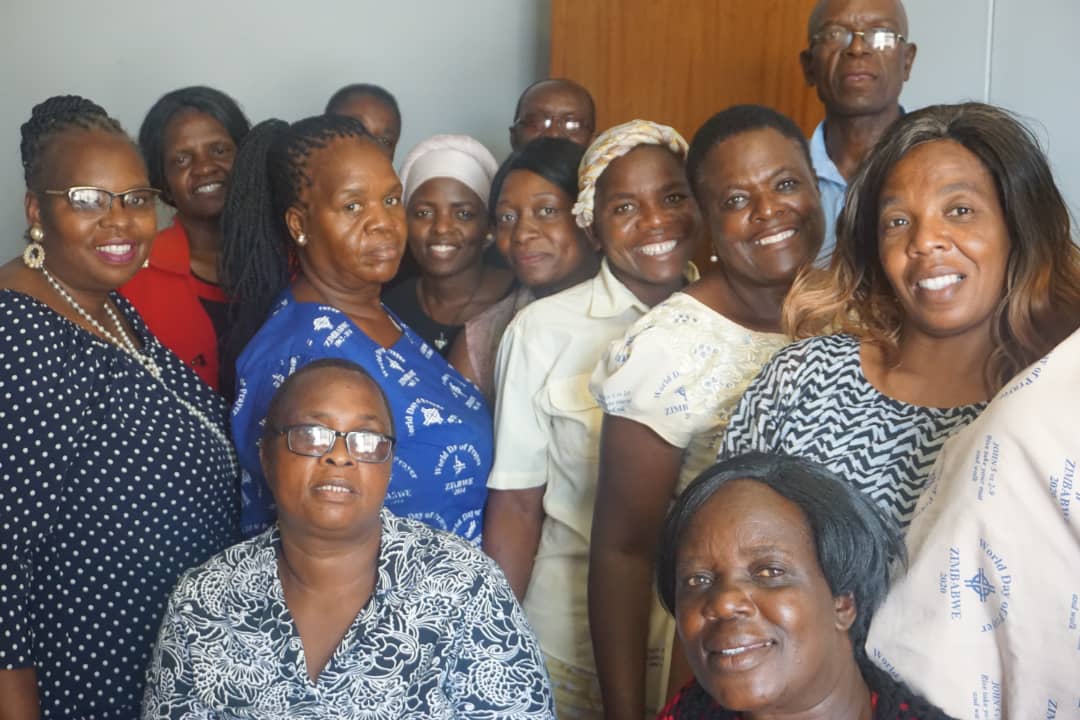
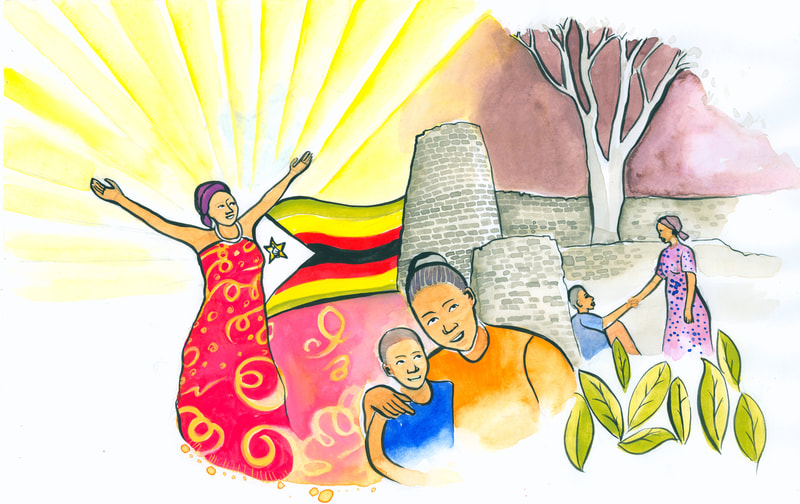

 RSS Feed
RSS Feed